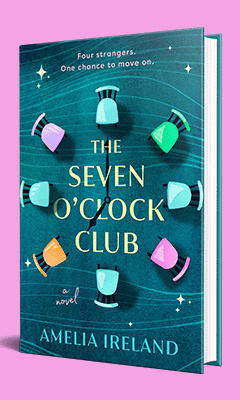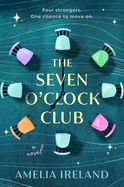The Seven O'Clock Club
by Amelia Ireland
Grief becomes a pathway to love, community, and healing in The Seven O'Clock Club by Amelia Ireland, a touching and startling debut novel that asks how to put into words a sorrow that feels beyond comprehension and whether some wounds can ever mend.
Four strangers meet in an experimental counseling group facilitated by Genevieve, a counselor who explains that her program's purpose is "exploring alternative ways of navigating the grief process... with a small group of people who have recently lost someone." The story opens with an epilogue as a prologue, with Genevieve reflecting on the events about to unfold, confessing to an unknown listener, "For weeks afterwards, I thought I'd lost everything. My job, my credibility, the respect I'd built up with you." She adds ominously that she would not change the past "[e]ven though it didn't work out the way any of us wanted it to."
The foursome could hardly be more different: Victoria, a middle-aged lawyer with "[p]erfect nails, enormous engagement ring. Stupidly shiny hair"; Mischa, a young woman described as "the human equivalent of a baby mouse"; Freya, an interior designer who hadn't left her house in six months until the first session; and Callum, a famous singer-songwriter whose good looks cannot disguise the "tell-tale signs of a haunted human being." Each of them is drowning in a private well of grief and reluctant to share their pain, even though most of them feel isolated in their lives outside counseling. Mischa thought her coworkers might become her friends, but they haven't spoken with her since she had an "episode" at work. Freya and her husband are locked in a silent dance of avoidance. Callum's fame came at the price of his privacy, and his unhealthy coping mechanisms have hurt his career and estranged him from his family. Victoria claims to have no issues with grief or otherwise and to have joined the group only to placate her adored husband, leaving the others to wonder why he would have suggested she join.
Genevieve asks them to share their internal lives with each other a bit at a time, beginning with childhood memories, fostering a bond between them. Walls slowly come down. Callum shares his struggles with substance abuse, "[f]ully expecting to see the usual combination of shock and disgust plastered across their faces. But what I saw staring back at me was the exact opposite." Victoria continues to insist she feels nothing at all about the bereavement she suffered, but she begins to open up about her past. Ties form within the group. Victoria, who had a strained relationship with her mother, begins to watch out for waifish Mischa, who is alone in the world. Freya and Callum develop a deep connection neither of them expected, but the attraction brings turmoil instead of excitement. As the group struggles through setbacks and conflicts, revelations of their individual pain surface. However, when all their truths finally rise to the light, healing comes with difficult choices. Genevieve is no ordinary counselor, and her sessions have an end goal none of the participants could ever have imagined.
This propulsive, heartfelt novel is grounded in moving depictions of bereavement, with each section of chapters named after a Kübler-Ross stage of grief. The character portraiture on its own would make the journey worthwhile here. Each group member has a unique arc and their own reactions to their personal tragedies, from Victoria's stern refusal to feel anything to Freya's depression. The first-person point of view shifts among the foursome, but Ireland has written their voices so distinctly that changes in perspective never leave one uncertain which character has taken over the narration.
The plot progresses through the lens of a profound interiority that homes in on each private experience of grief and highlights its complex and personal nature. The human element stands in especially sharp relief set against the backdrop of the ordinary building where the therapy sessions take place, the spare sketch of the physical setting leaving boundless space for consideration of the dialogue and relationship dynamics. The gradual, stepped reveal of each group member's past keeps suspense and curiosity high. Many readers will speed through the novel in a single sitting, feeling as though the experience passed in a blink thanks to Ireland's nimble pacing and frequent narrative twists. Connections between characters ring true, and Victoria's steady devotion to her husband, Andrew, is a poignant counterpoint to the hesitant yet inescapable chemistry between Freya and Callum.
The Seven O'Clock Club combines Remarkably Bright Creatures's exploration of loss and loneliness with The Midnight Library's themes of choice and possibility. Readers seeking an engrossing emotional journey that deeply engages their sympathy and offers thought-provoking surprises with a touch of magical realism will find much to like in this life-affirming ensemble drama. --Jaclyn Fulwood








